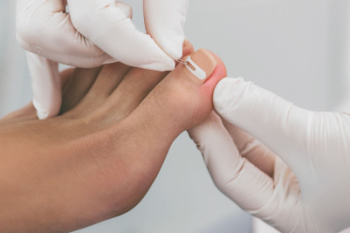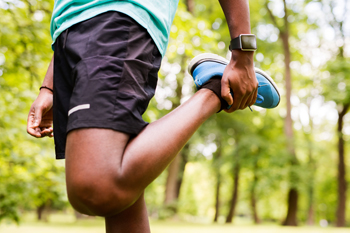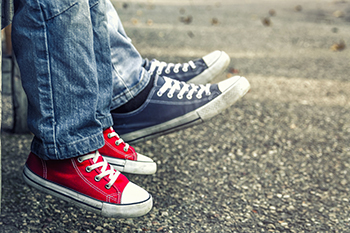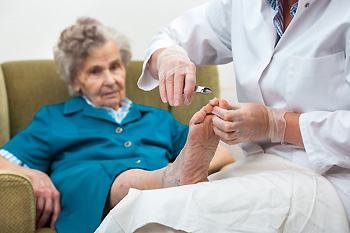
(908) 381-8160Berkeley Heights
 An ingrown toenail occurs when the edge of a toenail grows into the surrounding skin, causing pain and swelling. This often happens due to improper nail trimming, wearing tight shoes, or having naturally curved nails. When the toenail pierces the skin, it can create an entry point for bacteria, leading to an infection. Signs of an infected ingrown toenail can include redness, swelling, warmth, and pus. If the infection is not treated, it can worsen, leading to severe pain, increased swelling, and potentially serious complications such as spreading the infection or a bone infection. To treat an ingrown toenail infection, start by soaking the affected foot in warm, soapy water several times a day to reduce swelling and relieve discomfort. After soaking, apply an antibiotic ointment and cover the area with a clean bandage. Avoid wearing tight shoes and opt for open-toed footwear to reduce pressure on the toe. If the infection persists or worsens, it is suggested that you schedule an appointment with a podiatrist who can provide proper treatment, which may include minor procedures to remove part of the nail and prevent further issues.
An ingrown toenail occurs when the edge of a toenail grows into the surrounding skin, causing pain and swelling. This often happens due to improper nail trimming, wearing tight shoes, or having naturally curved nails. When the toenail pierces the skin, it can create an entry point for bacteria, leading to an infection. Signs of an infected ingrown toenail can include redness, swelling, warmth, and pus. If the infection is not treated, it can worsen, leading to severe pain, increased swelling, and potentially serious complications such as spreading the infection or a bone infection. To treat an ingrown toenail infection, start by soaking the affected foot in warm, soapy water several times a day to reduce swelling and relieve discomfort. After soaking, apply an antibiotic ointment and cover the area with a clean bandage. Avoid wearing tight shoes and opt for open-toed footwear to reduce pressure on the toe. If the infection persists or worsens, it is suggested that you schedule an appointment with a podiatrist who can provide proper treatment, which may include minor procedures to remove part of the nail and prevent further issues.
Ingrown toenails can become painful if they are not treated properly. For more information about ingrown toenails, contact Dr. Janet Leicht of New Jersey. Our doctor can provide the care you need to keep you pain-free and on your feet.
Ingrown Toenails
Ingrown toenails occur when a toenail grows sideways into the bed of the nail, causing pain, swelling, and possibly infection.
Causes
Prevention
Because ingrown toenails are not something found outside of shoe-wearing cultures, going barefoot as often as possible will decrease the likeliness of developing ingrown toenails. Wearing proper fitting shoes and using proper cutting techniques will also help decrease your risk of developing ingrown toenails.
Treatment
Ingrown toenails are a very treatable foot condition. In minor cases, soaking the affected area in salt or antibacterial soaps will not only help with the ingrown nail itself, but also help prevent any infections from occurring. In more severe cases, surgery is an option. In either case, speaking to your podiatrist about this condition will help you get a better understanding of specific treatment options that are right for you.
If you have any questions please feel free to contact our office located in Berkeley Heights, NJ . We offer the newest diagnostic and treatment technologies for all your foot and ankle needs.

Preventing running injuries involves a combination of proper techniques, consistent training, and adequate recovery. It is essential to wear well-fitted shoes that provide ample support and cushioning to reduce impact stress on your joints. Gradually increasing your mileage and intensity allows your body to adapt and strengthen muscles, tendons, and ligaments over time. Incorporating a comprehensive warm-up routine before running prepares your muscles for the exertion ahead and can help prevent strains. Strength training and flexibility exercises are vital as they enhance muscle balance and joint stability. Listening to your body and taking rest days when needed can prevent overuse injuries, ensuring long-term sustainability in your running routine. Hydration and proper nutrition also play vital roles in maintaining muscle function and recovery. If you have sustained a foot or ankle injury while running, it is suggested that you visit a podiatrist who can treat foot conditions while guiding you toward effective running injury prevention techniques.
All runners should take extra precaution when trying to avoid injury. If you have any concerns about your feet, contact Dr. Janet Leicht of New Jersey. Our doctor will treat your foot and ankle needs.
How to Prevent Running Injuries
There are a lot of mistakes a runner can make prior to a workout that can induce injury. A lot of athletes tend to overstretch before running, instead of saving those workouts for a post-run routine. Deep lunges and hand-to-toe hamstring pulls should be performed after a workout instead of during a warmup. Another common mistake is jumping into an intense routine before your body is physically prepared for it. You should try to ease your way into long-distance running instead of forcing yourself to rush into it.
More Tips for Preventing Injury
If you have any questions, please feel free to contact our office located in Berkeley Heights, NJ . We offer the newest diagnostic and treatment technologies for all your foot care needs.
 Children’s footwear plays a significant role in the development of their feet and the way they walk, known as their gait. Shoes that are ill-fitted or lack proper support may lead to many foot conditions, such as flat feet, hammertoe, or even issues with posture and balance. Investing in properly fitting shoes helps children's feet grow correctly, supports a natural gait, and aids in maintaining good body alignment. Shoes that are too tight or too loose, can lead to discomfort, or possible long-term health issues. Children’s feet are still developing, and their bones, muscles, and ligaments are not fully formed. Wearing unsupportive footwear during these stages of life can cause permanent damage and affect their ability to participate in daily activities. Quality shoes should have a flexible sole to allow natural movement, plenty of room for the toes, and good arch support to encourage proper foot mechanics. If any issues regarding your child’s foot health arise, it is suggested to visit a podiatrist for a thorough exam and appropriate treatment.
Children’s footwear plays a significant role in the development of their feet and the way they walk, known as their gait. Shoes that are ill-fitted or lack proper support may lead to many foot conditions, such as flat feet, hammertoe, or even issues with posture and balance. Investing in properly fitting shoes helps children's feet grow correctly, supports a natural gait, and aids in maintaining good body alignment. Shoes that are too tight or too loose, can lead to discomfort, or possible long-term health issues. Children’s feet are still developing, and their bones, muscles, and ligaments are not fully formed. Wearing unsupportive footwear during these stages of life can cause permanent damage and affect their ability to participate in daily activities. Quality shoes should have a flexible sole to allow natural movement, plenty of room for the toes, and good arch support to encourage proper foot mechanics. If any issues regarding your child’s foot health arise, it is suggested to visit a podiatrist for a thorough exam and appropriate treatment.
Making sure that your children maintain good foot health is very important as they grow. If you have any questions, contact Dr. Janet Leicht of New Jersey. Our doctor can provide the care you need to keep you pain-free and on your feet.
Keeping Children's Feet Healthy
Having healthy feet during childhood can help prevent medical problems later in life, namely in the back and legs. As children grow, their feet require different types of care. Here are some things to consider...
Although babies do not walk yet, it is still very important to take care of their feet.
Avoid putting tight shoes or socks on his or her feet.
Allow the baby to stretch and kick his or her feet to feel comfortable.
As a toddler, kids are now on the move and begin to develop differently. At this age, toddlers are getting a feel for walking, so don’t be alarmed if your toddler is unsteady or ‘walks funny’.
As your child gets older, it is important to teach them how to take care of their feet.
Show them proper hygiene to prevent infections such as fungus.
Be watchful for any pain or injury.
Have all injuries checked by a doctor as soon as possible.
Comfortable, protective shoes should always be worn, especially at play.
If you have any questions please feel free to contact our office located in Berkeley Heights, NJ . We offer the newest diagnostic and treatment technologies for all your foot and ankle needs.
 Elderly foot care involves regular inspection, cleaning, and maintenance to ensure overall foot health. It is important because aging feet are more susceptible to incurring conditions like dry skin, brittle nails, and decreased circulation, which can lead to severe issues if not properly managed. As we age, feet undergo various changes such as thinning skin, loss of cushioning fat pads, and reduced blood flow. These changes can result in common problems like corns, calluses, bunions, and toenail disorders. Proper foot care includes daily washing, moisturizing to prevent dryness, trimming nails correctly, and wearing well-fitted, supportive shoes. Regular exercise and stretches can help maintain flexibility and strength. Monitoring for signs of infection, swelling, or other abnormalities is essential. Due to the increased risk of complications such as ulcers or infections especially in individuals with diabetes, it is suggested that if you are elderly, you visit a podiatrist regularly for professional care and advice.
Elderly foot care involves regular inspection, cleaning, and maintenance to ensure overall foot health. It is important because aging feet are more susceptible to incurring conditions like dry skin, brittle nails, and decreased circulation, which can lead to severe issues if not properly managed. As we age, feet undergo various changes such as thinning skin, loss of cushioning fat pads, and reduced blood flow. These changes can result in common problems like corns, calluses, bunions, and toenail disorders. Proper foot care includes daily washing, moisturizing to prevent dryness, trimming nails correctly, and wearing well-fitted, supportive shoes. Regular exercise and stretches can help maintain flexibility and strength. Monitoring for signs of infection, swelling, or other abnormalities is essential. Due to the increased risk of complications such as ulcers or infections especially in individuals with diabetes, it is suggested that if you are elderly, you visit a podiatrist regularly for professional care and advice.
Proper foot care is something many older adults forget to consider. If you have any concerns about your feet and ankles, contact Dr. Janet Leicht from New Jersey. Our doctor can provide the care you need to keep you pain-free and on your feet.
The Elderly and Their Feet
As we age we start to notice many changes in our body, but the elder population may not notice them right away. Medical conditions may prevent the elderly to take notice of their foot health right away. Poor vision is a lead contributor to not taking action for the elderly.
Common Conditions
Susceptible Infections
Diabetes and poor circulation can cause general loss of sensitivity over the years, turning a simple cut into a serious issue.
If you have any questions please feel free to contact our office located in Berkeley Heights, NJ . We offer the newest diagnostic and treatment technologies for all your foot and ankle needs.